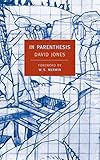All Categories


David Jones: Engraver, Soldier, Painter, Poet
Share Tweet
Get it between 2024-05-16 to 2024-05-23. Additional 3 business days for provincial shipping.
*Price and Stocks may change without prior notice
*Packaging of actual item may differ from photo shown
- Electrical items MAY be 110 volts.
- 7 Day Return Policy
- All products are genuine and original
- Cash On Delivery/Cash Upon Pickup Available








About David Jones: Engraver, Soldier, Painter, Poet
Among the revolutions of the last century, none was more important or potentially more lasting than the one in the arts called “Modernism”. Among the giants of that movement were writers who changed our conceptions of poetry and prose forever. Now, well into the new century, we can look back to admire and reflect on figures from that period. Last year saw biographies of two monumental poets of Modernism: Robert Crawford’s first volume on T. S. Eliot, and David Moody’s concluding third volume on the life of Ezra Pound. We are excited to announce the first full-length critical biography of the third member, too often overlooked, of that extraordinary group. The beautifully illustrated David Jones: Engraver, Soldier, Painter, Poet by Thomas Dilworth will stand for generations as the great biography this wonderful artist deserves. Jones (1895-1974) was a painter, a wood- and copper-engraver and maker of painted inscriptions, but it was as a poet that he left his most lasting mark. Eliot called him “one of the most distinguished writers of my generation” and Dylan Thomas said he “would like to have done anything as good as David Jones has done.” Auden praised his poem In Parenthesis as “the greatest book [ever] about the Great War”, and The Anathemata as one of the “truly great poems in Western Literature.” His work, the whole of it, enables him to stand alongside Eliot, Pound, and James Joyce as an incomparable figure in literary Modernism.


















